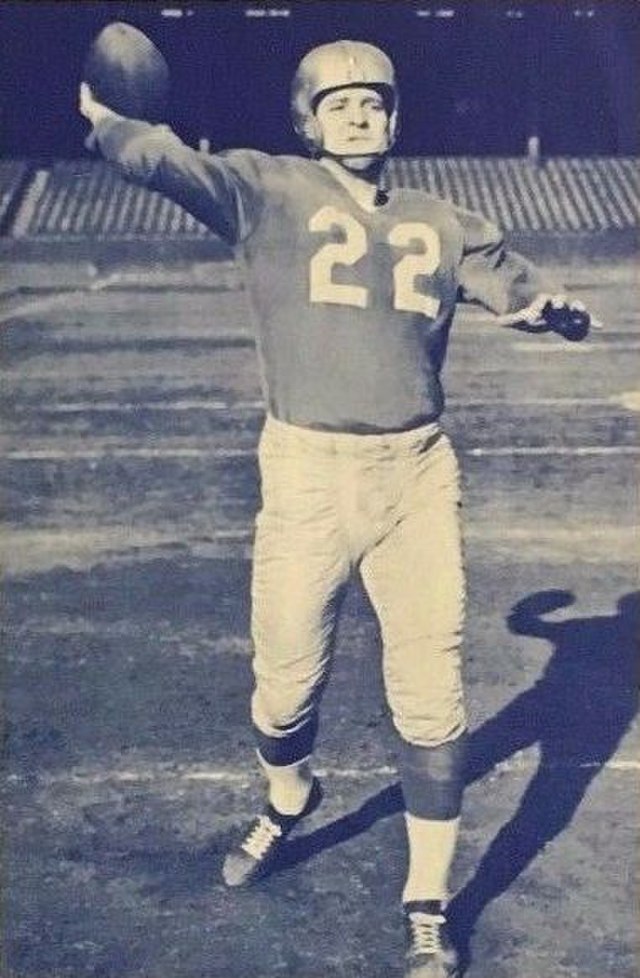If you are familiar with football or the Detroit Lions franchise specifically, you can recall the several devastating seasons they have had. Fans who have stuck around since the beginning would be able to remember the Lions’ 2008 season, when they made history, but not in a good way. The Lions became the first NFL franchise to go winless, with a 0-16 record, since the NFL schedule was expanded to 16 games. Most people’s first instinct would be to blame this lack of success on the players, coaches, or management. But if you were to ask a Michigander why they think their team has not been successful, they would most likely blame it on former Lions’ Quarterback Bobby Layne. Here are five things you need to know about Bobby Layne and the curse he placed on the Detroit Lions franchise.
The Curse of Bobby Layne
1. Bobby Layne’s early life was anything but easy
Bobby Layne was born on December 19, 1926, in Santa Anna, Texas. At the age of eight, Layne’s life turned upside down when his father passed away at the age of 36. This tragedy had a significant emotional and financial effect on the Layne family. Layne’s mother, Bea, did not have the money to support all three of her children financially. Shortly after the death of his father, Layne was sent to Fort Worth, Texas, to be raised by his uncle and aunt, Wade and Mimi Hampton. Eventually, Layne’s aunt and uncle officially adopted him and moved to Highland Park, Texas.
After experiencing such tragedies early on, Lane found refuge on the football field. During Layne’s senior year of high school, he was named quarterback for the all-state team that played in the Oil Bowl All-Star Game. Layne also helped lead Highland Park to the Texas state semifinals, where his team faced defeat from San Angelo.
2. Bobby Layne went down in history as one of the best Quarterbacks in Longhorn history
When deciding where to continue his football career after high school, Layne decided to stay close to home and attend the University of Texas at Austin. At UT Austin, Layne was nothing short of a star on the football field, becoming one of the best quarterbacks in UT Austin history.
Due to World War II, college football suffered a massive shortage of players and because of this, it permitted Freshmen to get playing time, allowing Layne to have a massively successful four-year career. During his freshman year, Layne played all but one game, leading the Longhorns to the Southwest Conference Championship, where they sadly lost 6-7 to Texas Christian University. Layne missed the season’s first six games during his sophomore year as he served in the Merchant Marines for eight months. Layne did not cause a single loss for the remaining five games, ending the season with a 10-1 record and leading his team to winning the Southwest Conference. Even with Layne’s lack of presence that season, he was still named QB for the all-conference team.
After Layne’s second season ended, the Longhorns had one more game to play, the Cotton Bowl Classic. Layne led the Long Horns to a 40-27 victory over Missouri. Layne contributed heavily to the Long Horns’ success, Completing 11 out of 12 passes, leading to all 40 points, and kicking four field goals. Layne’s precision and versatility as a player led to him being named one of the outstanding players in the Cotton Bowl. Layne ended up setting multiple records. He set ten Cotton Bowl records, ten University of Texas Records, and four NCAA records.
3. The beginning of Layne’s NFL career was rough, to say the least
In the 1948 NFL Draft, the Pittsburgh Steelers picked Layne third overall. The Baltimore Colts drafted Layne second overall in the AAFC Draft in the same year. Layne was upset about his situation, as he had no desire to play for the Steelers. The Steelers granted Layne his wish and quickly traded him to the Chicago Bears. Despite the 77,000-dollar offer the Colts made to Layne, George Halas, the founder and owner of the Chicago Bears, talked Layne into signing with the Bears after the Sugar Bowl.
Unfortunately, Layne’s first season with the Chicago Bears did not go as planned. With two iconic quarterbacks, Sid Luckman and Johnny Lujack, on the Bears roster, Layne became the third-string quarterback. Layne did not like his lack of playing time, and in an attempt to fix the situation, he tried to convince the Bears to trade him to a rival team, the Green Bay Packers, but the Bears did not like this idea.
Instead, the Bears traded Layne to the New York Bulldogs for 50,000 dollars and two draft picks. Although Layne had a less-than-successful year-long career with the Bulldogs score-wise, it was clear that he was developing into a talented and promising QB. In 1950 the Bulldogs agreed on a blockbuster trade, sending Layne to the Detroit Lions in return for wide receiver Bob Mann.
During Layne’s eight seasons with the Detroit Lions, he accomplished quite a lot. During his time with the Lions, he led his team to the NFL Championship four teams, ending in three championship wins and one loss. He threw for an average of 1942 yards and 16 touchdowns during his eight full seasons with Detroit. But during less successful seasons, such as the Lion’s 3-9 season in 1955, Layne received much backlash from the fans.
4. Bobby Layne’s relationship with the Detroit Lions was very complicated.
Layne had created a reputation for himself in Detroit, and it was not necessarily a good one when it came to his affiliation with the Detroit Lions. He was a notorious partier, and this often got him in trouble. Lucky for him, his celebrity status often got him out of trouble with law enforcement.
Things between the Detroit Lions got quite complicated in 1957 when head coach Buddy Parker acquired the starting QB of the Green Bay Packers, Tobin Rote. Rote served as both a younger and much more tame counterpart to QB Bobby Layne, who, before the season, was arrested due to a drunk driving incident where he was driving on the opposite side of the road after having six drinks.
Things got much more complicated when Head Coach Buddy Parker suddenly quit, stating that the 1957 Lions team was “the worst team I’ve seen in training camp”. Things continued to escalate when Layne found himself out of his starting quarterback position and instead shared field time with Rote. George Wilson, the new head coach, rotated Layne and Rote depending on who was having a better week of practice.
This system of determining playing time ended when Layne broke his leg late in the 1957 season against the Cleveland Browns. Rote took Layne’s spot on the field and secured a 20-7 win. Rote then won three games, the Chicago Bears, San Fransisco 49er, and the Cleveland Browns, to secure the Lion’s third NFL Championship win.
During the 1958 season, Wilson planned on doing the same rotation system, but things quickly turned for the worse when Layne’s partying ways got the best of him once again. Layne reportedly showed up under the influence to a Saturday team meeting the day before the Lions’ 13-13 tie to the Indianapolis Colts. This situation created a sense of disdain between the two quarterbacks. Wilson decided that he had enough of Layne’s antics and was more than happy to trade him to the Pittsburgh Steelers when former Lions head coach Buddy Parker reached out.
5. The trade hurt Bobby Layne incredibly
Layne did not take this trade lightly. He had formed a love for the city of Detroit and the franchise he had played with for eight years. Not only did he enjoy his career in Detroit, but he had created several friendships that he felt could never be replaced. When talking to the press, Layne stated, “But it actually it hurts me…I gave my heart and soul to play football. I really tried to play my best…I’ve got an awful lot of friends here, and I hate to leave”.
Although the “curse” was never confirmed, it was alleged that Layne placed the curse on the Lions as he left the facility, many citing that he stated the Detroit Lions would not win for 50 years.
Although a curse could never be confirmed, it was apparent that Layne’s presence deeply affected the Lions’ performance. The Lions went 4-7-1 after going 8-4 the season prior and won the NFL Championship. It is safe to say that this “curse” carried on throughout NFL seasons. Just this year, the Detroit Lions finally won a playoff game since their 1992 wins against the Dallas Cowboys. Perhaps blaming the Lions less than successful history on Bobby Layne gives fans a way to understand the franchise’s lack of success despite having star players such as Calvin Johnson and Matthew Stafford on their roster.



